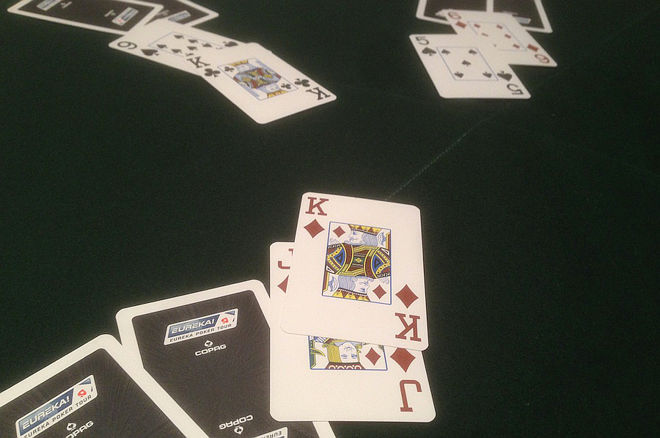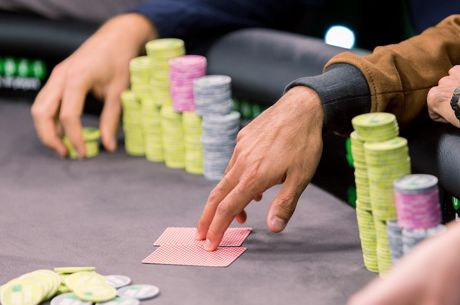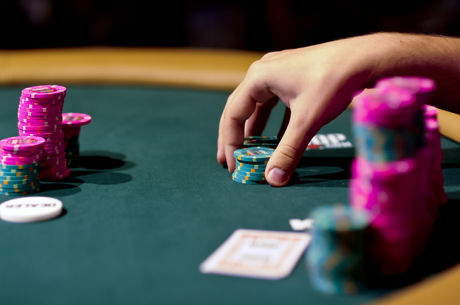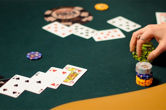Remembering Cards in Seven-Card Stud

It is highly useful in seven-card stud to be able to recall the cards that have been folded. This is true for two reasons chiefly.
By knowing the cards that have been folded, the astute and thoughtful player will be better able to know the likelihood of the as-of-yet unseen cards that remain to be dealt. Secondly, by combining the cards the player has seen with a knowledge of the cards that have been folded, along with the betting of the other players, that player will better be able to assess the cards that are held by his opponents.
There exist a few among us who are possessed with the innate ability to recall all cards exactly as they were dealt. If you are one of those savants, possessing such perfect, photographic memory, then read no further. You do not need to improve on the skill you already possess. But for everyone else — read on.
Card memory is, for the vast majority of us, a skill to be learned, if not completely mastered. The key, I have found, is to narrow and organize that which we are trying to remember.
Some books and articles about seven-card stud direct students of the game to focus on the cards as they are coming out of the deck, giving each a name that helps with word association skills to keep track of each individual card — much as you might do to remember names of people at a party. The 3♣ becomes “Thrifty Charlie,” the J♦ “Johnny’s Dame,” the 9♣ “Nice Charlie,” and so on.
But this isn’t necessarily such good advice, at least when trying to remember more than a few cards. Do not try and remember the full name of each card as it is dealt! Rather, do the following.
Remembering Ranks
First off, focus only on those cards that are folded. The other cards that are dealt are sitting in front of you, and therefore do not need to be remembered. Similarly, focus first on the rank of the card, not its suit. (We’ll deal with remembering suits later.) Got it? Ranks only, no suits.
Once the low card brings in the betting, follow the action around the table, committing to memory the rank of each card as it is folded. Say it to yourself, lengthening your list by one each time a card is folded.
For example, on the first round of betting, as the 9♣, 4♣, 4♥, and K♣ are each folded, just say each rank to yourself — “9, 4, 4, king.” Repeat that list over and over again, as a mantra, as the next round is dealt and before the folding for the next round of betting begins. I find it useful to put the list in numeric order, starting with the low card — hence, “4, 4, 9, king.”
On the next round of betting, I add to the list as more cards are folded. If a player with a 3x and Ax up folds on fourth street, I will change my repeated series of numbers to “ace, 3, 4, 4, 9, king,” saying it over and over again in my head as fifth street is dealt out, like playing a recording on a loop. Continue to do this as the game is played.
Typically, if your opponents are at least one notch above beginner level, nearly all of the folded cards will occur on third and fourth street. This means by the time the game reaches the end of fifth street you will usually have a manageable list of 7 to 10 digits to remember. That should not be too hard to do — it’s about what a typical phone number is these days.
Remembering Suits
Suits are another matter. My first concern is to make a special notice of any suit that I might need to make a flush — that is, if I start with two or three of that suit. To give an example, if my starting hand were (A♥J♥) / 4♥, I would keep an accurate list in my head of all hearts that had been folded to be able to assess my odds of making my flush as the hand proceeds.
In all other situations, I make an initial mental note to myself of how many of each suit have been folded on third street without worrying about keeping track of the number as the hand is played. I find that just making that mental note on third street and then updating it on fourth street is sufficient for me to recall the fact later in the hand if it becomes useful to do so.
If I am observant, I’ll see on fifth street that one player started with two hearts and now has a spade as well. Meanwhile thanks to my earlier tally of suits, I’ve also noticed three hearts were folded on third and fourth street. By combining my recollection of folded cards with the cards I see, I find that I am able to assess more accurately the likelihood that my opponent is actually on a flush draw.
Conclusion
To summarize, then — the key is to turn the rank of the folded card into a kind of numerical mantra, and then to just make a mental note of how many of each suit are folded. This isn’t as good as perfect card memory of course, but I have found that it is more than sufficient to give me an edge over my opponents in the typical stud game.
One last note. Unlike many poker skills, this is the one skill that you actually can practice away from the poker game. All you need is a deck of cards and some time. Deal out eight up cards and “fold” them in turn. Work on keeping track of their rank, while noticing how many of each suit have been folded.
I have found that this process actually helps me retain more information at the table when I am in a game. As they say, “practice makes perfect.”
Ashley Adams has been playing poker for 50 years and writing about it since 2000. He is the author of hundreds of articles and two books, Winning 7-Card Stud (Kensington 2003) and Winning No-Limit Hold’em (Lighthouse 2012). He is also the host of poker radio show House of Cards. See www.houseofcardsradio.com for broadcast times, stations, and podcasts.
Want to stay atop all the latest in the poker world? If so, make sure to get PokerNews updates on your social media outlets. Follow us on Twitter and find us on both Facebook and Google+!









